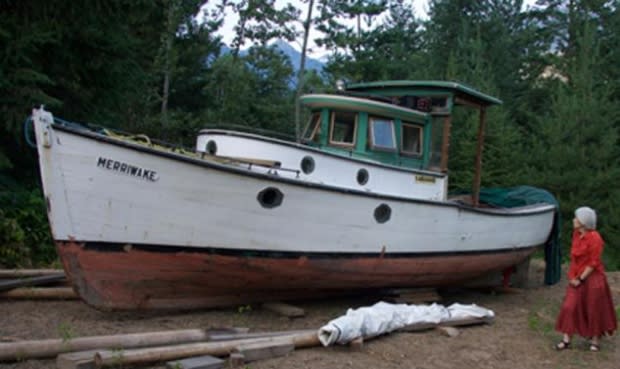Interior B.C. historical society restoring 90-year-old Japanese-Canadian boat
The Merriwake fishing boat first hit the water 90 years ago near Prince Rupert, B.C.
The gillnetter built by master boat-maker Isamu Matsumoto belonged to a Japanese-Canadian fisherman. However, it was confiscated from him in 1942 when he and 22,000 other Japanese-Canadians were forced into internment camps during the Second World War.
Today, the Slocan Valley Historical Society is trying to raise between $20,000 and $30,000 to restore the boat to display it on a permanent dry dock near the village of Slocan in the West Kootenay region.
"We're really hoping that having the Merriwake as a display with interpretive panels, and telling her story, will help to keep [the internment camps] top of mind and people won't forget what [Japanese-Canadians] went through," said Joyce Johnson, president of the society.
Boat's journey
After the boat's owner, whose name is unknown, was sent to an internment camp in the Slocan Valley, the Merriwake was sold to a number of different owners.
"It sort of journeyed in the same way that the Japanese-Canadians did. It was, you might say, interned when it was confiscated by the government and sold to B.C. packers," said Johnson. "In 1951, it went into private use."
In 2011, a man named Ted Fitzgerald purchased the boat and brought it to Kaslo. His plans to use the boat for tourism operations didn't work out and eventually the boat sank in Kootenay Lake because of leaks, said Johnson.

A group of people in town who wanted to salvage the boat formed a society called the Friends of Merriwake. One of the members of the group is celebrated Canadian author Joy Kogawa.
Kogawa and the group reached out to The Slocan Valley Historical Society to restore the boat, and in July of 2018 the society paid $4,500 to buy and transport the boat to a boat shop outside of Nelson to be restored.
"Wooden boats I'm told don't last 90 years generally," said Johnson.
"At about 60 years they've kind of hit their mature level and are starting to deteriorate. But this one was really well-looked-after and really well-loved by many of its owners."
Remembering history
Johnson said the society wants to restore the boat to try and share the history of internment camps in the Slocan Valley.
"[The boat] really highlights the resiliency and the perseverance of the Japanese-Canadian people. They were able to come out of a time when they were stripped of absolutely everything," she said.
"It represents a time in our nation's history we can't forget."
Many remnants of the internment camps were bulldozed after the war, said Johnson.
"There is nothing much left of the internment era and without a tangible artifact to be able to talk about and tell the history, it runs the risk of of being forgotten and we don't want to see that happen."
Raising funds
The society is now trying to raise the funds they need to restore the boat and create a shelter for it.
They are also going to be doing research on the original owner of the boat and where his descendants are, said Johnson.
She hopes they can have the boat on display by the fall of 2020.
"We want to tell her story. It's a pretty fascinating story," she said.
"People are really interested in it....They're excited to see the boat being restored and being in Slocan."

